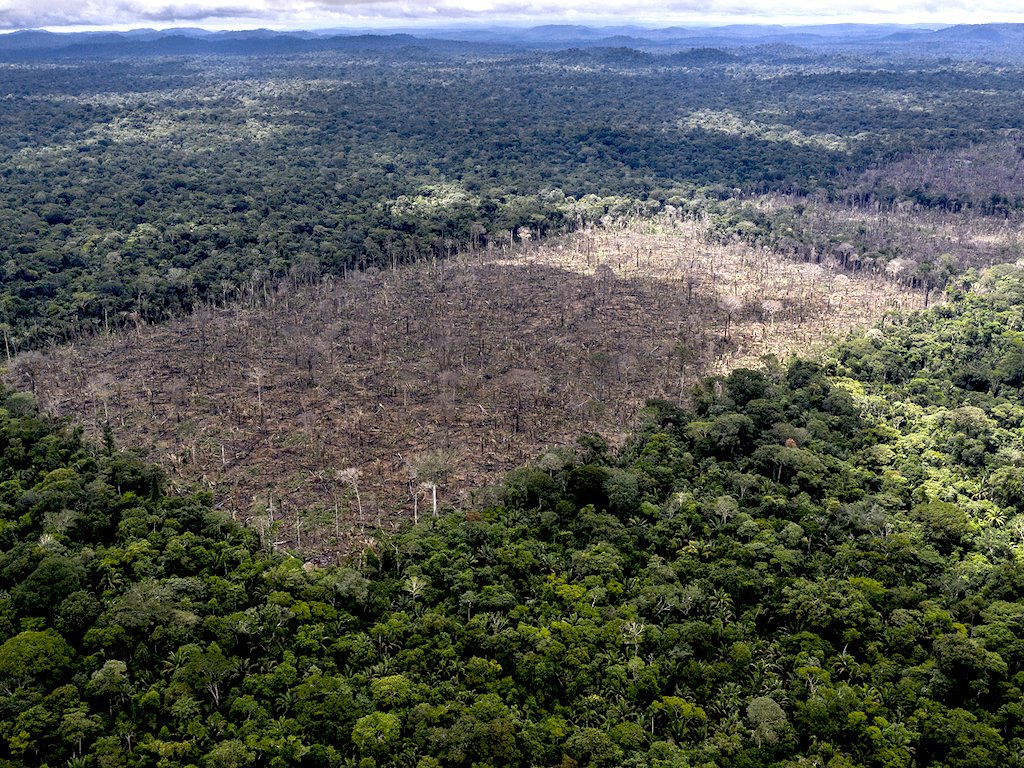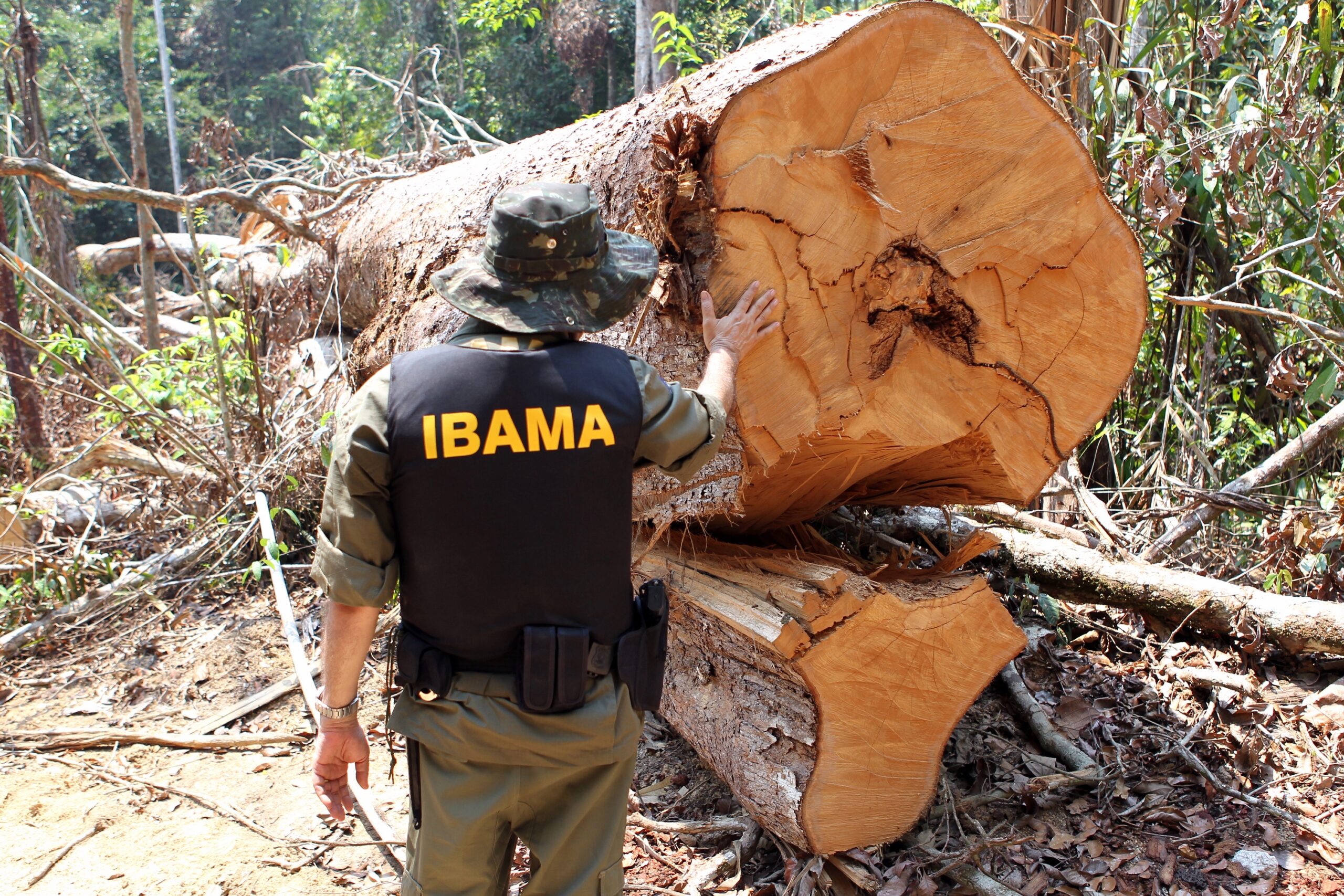5 Mins Read
A Brazilian cattle farmer has been fined $50M for destroying parts of the Amazon rainforest, and ordered to restore the land he deforested.
A federal court in Brazil last month froze the assets of a local cattle rancher, ordering him to pay $50M in climate compensation for damage caused to the Amazon rainforest through illegal deforestation.
The case was brought by the national attorney general’s office on behalf of the Brazilian Institute of Environment and Renewable Natural Resources (IBAMA), which accused Dirceu Kruger of damaging the Amazon – already close to a tipping point – to make space for cattle farming.
Once known as the “lungs of the Earth”, widespread deforestation in the Amazon for foods like beef, soybean and cocoa has converted the rainforest from a carbon sink to a carbon source. This means it emits more of the greenhouse gas than it absorbs, and the court’s order recognised this, asking Kruger to restore the land he degraded so it can once again become a valuable carbon sink.
The prosecution argued that Kruger had harmed the climate by burning vegetation – which directly generates greenhouse gases – and eliminating plants, which meant the forest could no longer sequester carbon.
According to the UN Food and Agriculture Organization, cattle ranching is the leading cause of deforestation in the rainforest, accounting for 80% of forest destruction and 340 million tons of carbon emissions annually.
Cattle farmer ordered to restore damaged land

First filed in September 2023, this is the largest civil action case for climate change in Brazil. The plaintiffs argued that Kruger’s actions illegally interfered with the forest’s carbon stock and intensified the climate crisis by emitting greenhouse gases.
They suggested that the climate damage caused is intergenerational, as it spreads indefinitely and will lead to future environmental harm. Moreover, Ibama and the attorney general’s office said Kruger’s conduct was in violation of the Paris Agreement and Brazil’s international obligations.
The cattle farmer used chainsaws to cut trees, set fires to clear the land, and then planted grass as pasture for cattle grazing. Satellite imagery showed the scale of the damage caused by Kruger, who admitted doing so on film.
The attorney general’s office charged Kruger with destroying 5,600 hectares of public land (owned by the federal government and the state of Amazonas) in the municipalities of Boca do Acre and Lábrea between 2003 and 2016.
When it came to the damages, the court assessed the prosecution’s value of €60 ($65) per tonne of carbon, derived from the social cost of carbon calculated by the US Environmental Protection Agency and UN Organization for Economic Cooperation and Development (OECD) – although more recent research from the US National Bureau of Economic Research (which is yet to be peer-reviewed) puts that number at $1,056 per tonne.
According to the court filing, an average of 161 tonnes of CO2 is released into the atmosphere for each Amazonian hectare that is destroyed, and Kruger’s actions were adjudged to have emitted 901,600 tonnes. This amounted to 292 million Brazilian reals, or around $50M, in liable damages. The money paid by Kruger would go to the national climate change fund, which aims to finance projects and research to reduce greenhouse gas emissions and adapt to the impacts of the climate crisis.
Apart from the monetary fine, Kruger’s assets have been frozen, and he is barred from transferring his land to a third party, selling or donating cattle and agricultural products, or leasing chainsaws and other deforestation tools. He is also banned from receiving any government finance or tax credits.
Additionally, Kruger will need to restore the land he damaged. The court noted that this approach of making offenders pay compensation is important as this climate damage can never be fully remedied.
Attorney general hints at more climate cases over Amazon deforestation

The Amazon rainforest is home to half of the world’s tropical forests and over three million species of plants and animals, but continued deforestation – both legal and illegal – has put 10-47% of its forests at risk of collapse by 2050. The Brazilian part of the Amazon accounts for the majority of the rainforest’s deforestation, as well as 40% of global tropical deforestation.
In 2020, Brazilian climate organisation network Observatório do Clima revealed that former president Jair Bolsonaro’s reign from 2019-22 saw a 60% increase in Amazon deforestation compared to the four years before – the highest increase among presidential terms since records began in 1988.
Since then, Luiz Inácio Lula da Silva’s government has been updating the country’s climate policy, and unveiled plans to meet the goal of eliminating deforestation from the Amazon by 2030. But as reported by the Guardian, Brazil’s supreme court has said more can be done, and ordered the federal government to restore a strategy to prevent and manage deforestation as well as investigate climate crimes in the rainforest.
In April, a marketing campaign by Natura, Forbes and Africa Creative labelled Amazon as the ‘world’s richest billionaire’, worth $317B. This valuation is seven times greater than the potential earnings derived from its destruction, highlighting the importance of preserving the rainforest.
“It is our duty to act not only to mitigate the problem, but to hold accountable in an exemplary manner those who accelerated the greenhouse effect illegally and for their own benefit, destroying the environment in violation of the Constitution and Brazilian legislation,” said Jorge Messias, Brazil’s attorney general.
Messias’s office has indicated that the case against Kruger is set to be “just the first of a series of actions that seek to repair the climate damage caused by the destruction not only of the Amazon, but of all Brazilian biomes”.
“To reclaim our leading role in the climate agenda and contribute to reducing emissions,” said Mariana Cirne Barbosa, the national attorney for climate defence. “Destroying nature cannot be worth it.”



